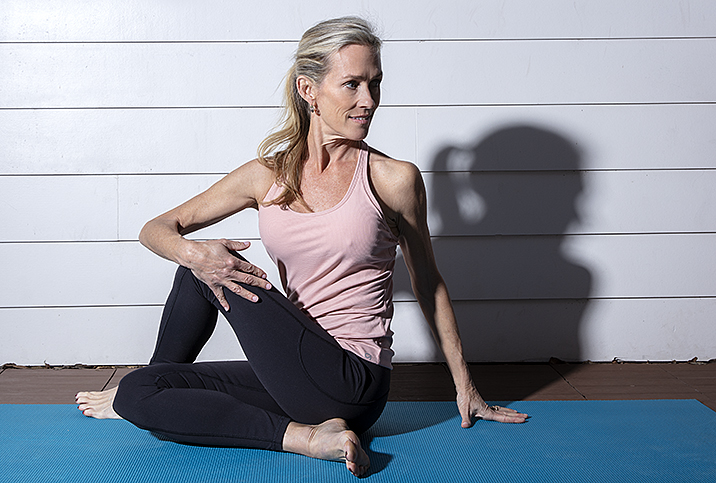Looking for Things to Spice Up Your Sex Life? Avoid 7 Everyday Habits

Key Points
- Your lifestyle can profoundly affect your health and well-being.
- Certain everyday habits could put you at risk for sexual health issues, among other problems.
- Making positive lifestyle changes could help get your health and sex life back on track.
How would you describe your sex life in three words?
If your answer includes anything synonymous with unsatisfying, frustrating or worse, nonexistent, it may say something about your relationship. But lifestyle factors may also be to blame.
You already know that bad habits such as smoking or drinking too much alcohol aren't doing you any favors, but they're not the only habits that need to be discussed.
Are you looking for things to spice up your sex life? Sometimes it's about the things you don't—or shouldn't—do. Let's look at seven everyday behaviors that could hamper your sex life and how you can make the changes needed to enhance it.
1. You don't drink enough water
"Not drinking enough water is bad news for all aspects of your health, including your sexual function," said Deborah Lee, M.B., Ch.B., a sexual and reproductive health specialist at Dr Fox, an online pharmacy in the United Kingdom. "Even mild dehydration causes symptoms including headache, dry mouth, dizziness, weakness, muscle pains and tiredness/lethargy—none of which are conducive to having great sex."
She added that dehydration increases the risk of urinary tract infections (UTIs) in women and is linked to erectile dysfunction (ED) in men.
How much you should drink depends on multiple factors, including your activity level, environment and overall health, according to Mayo Clinic. However, 124 fluid ounces of water is generally adequate for healthy men, while 92 fluid ounces is sufficient for most healthy women, according to the National Academies of Sciences, Engineering and Medicine (NASEM).
These recommendations include water and other beverages and moisture-rich foods, such as melons, cucumbers, apples, celery and leafy greens.
Deborah Lee noted that if it's hot out or you're highly active, you're pregnant or breastfeeding, or have a chronic condition such as diabetes, you may need to drink more.
2. You're constantly stressed
Some degree of stress is unavoidable. In small doses, it can even be beneficial. However, studies suggest chronic stress can wreak havoc on your health, contributing to problems such as exhaustion, depression, anxiety, low libido, erectile dysfunction and difficulty achieving orgasm. It may also make you more irritable and spark relationship tensions.
Stress-management techniques such as yoga, meditation and therapy may help, according to Erika Aragona, D.O., a sexual health advisor for lubricant manufacturer Astroglide and a family medicine physician in Meridian, Idaho.
"Also, set boundaries for work-life balance and make time for self-care and relaxation," she said. "Remember, making yourself a priority is not a bad thing. It's a healthy and necessary daily practice you need to focus on because living your best life starts with you."
It's equally crucial to carve out time for your partner, she explained. It may not sound as spontaneous as you'd like, but scheduling sex and date nights is one of the best ways to improve intimacy.
As a bonus, it could also help relieve stress.
3. You're always on your phone
Excessive screen time may be one of the worst bad habits for mental health, according to research.
Spending too much time online can be isolating, Aragona noted, and interfere with your ability to make or maintain real-life connections.
She added that watching too much porn, specifically, may also lead to desensitization and addictive behaviors, making it more challenging to perform sexually and enjoy physical intimacy.
Plus, unrestricted screen time is often part of a sedentary lifestyle, which can have adverse psychological and physical health effects, according to Martha Tara Lee, Ph.D., D.H.S., an AASECT-certified sex educator and clinical sexologist with Eros Coaching in Singapore. These effects can include the following:
- Being overweight or trending to obesity
- Low energy
- Depression
- Low desire and arousal
- Erectile dysfunction
Additionally, studies suggest a link between social media and body dysmorphia and dissatisfaction, which may diminish your self-esteem, confidence and sex drive. There's also a correlation between body image and eating disorders. The latter can profoundly affect overall health and well-being and contribute to issues such as depression, anxiety, subfertility or infertility, low libido, and ED.
Some screen time—including porn viewing—is fine, but again, boundaries are key.
"To address this, set screen-time limits on your devices, prioritize in-person interactions and intimacy over screen time, and if needed, seek professional help if you believe you have developed a pornography addiction," Aragona said.
Recommended
- What Are the Sexual Health Benefits of Pilates for Women?: Exercise is one of the best ways to bolster your well-being. Some forms, such as Pilates, could provide added benefits
- Scheduling Sex Helps Me Overcome Intimacy and Get in the Mood: Setting orgasm appointments could be the key to keeping the spark alive in a long-term relationship.
- How Exercise Improves Men's Sexual Health: Being physically active can enhance multiple facets of life, from mental health to sexual function.
4. You're not eating well
If you regularly plunder your junk food stash, you may be putting your health and sex life at risk.
"Junk foods are usually highly processed and loaded with fat, sugar and salt, all of which can negatively affect blood circulation, sexual function and mood," Deborah Lee said. "A subpar diet can also lead to problems such as weight gain and acne, cardiovascular disease, and type 2 diabetes. If unaddressed, the latter two can permanently damage the blood vessels and nerves, potentially contributing to issues including ED, reduced genital sensitivity or genital pain."
Conversely, eating a balanced and nutritious diet—the Mediterranean diet is one with research to back it—with lots of fruits, vegetables, lean proteins and healthy fats can enhance sexual health and general well-being, she added.
5. You don't get enough sleep
"Insomnia is strongly connected to sexual dysfunction," Deborah Lee said.
Sleep requirements vary from one person to another, but most people need at least seven to eight hours a night. Without it, you're more likely to be tired, irritable, and stressed and have trouble thinking and making decisions, among other issues. Lack of shuteye can also adversely affect libido, arousal, orgasms and relationships.
"Paradoxically, sex can improve sleep as it releases hormones such as prolactin and oxytocin that induce warm, pleasurable feelings," she said.
Besides having more sex, other ways to get better sleep include the following:
- Improve your sleep hygiene
- Avoid coffee or alcohol at least four hours before bedtime
- Never work from bed
"Your brain needs to know that when you get into bed, it's just for sleep or sex—nothing more," Deborah Lee said.
If you can't improve your sleep hygiene, talk to your doctor to rule out a sleep disorder and determine what might be affecting your sleep patterns.
"As a family medicine doctor, I cannot tell you how many chronic health issues I have helped my patients remedy once we developed healthy sleep habits," Aragona said. "It's amazing how getting into a good sleep routine can totally change your life."
6. You spend too much time sitting
About 1 in 4 Americans spend at least eight hours a day sitting, according to research. Having an office job can make sitting difficult to avoid, but cutting down on sitting time could yield significant health perks.
Prolonged sitting can lead to obesity, poor blood circulation and reduced sexual function, Martha Tara Lee said.
Research suggests people may also be at an increased risk of cardiovascular disease, depression, back and hip pain, headaches, and nerve damage from sitting too much.
"To minimize harmful effects, try to take regular breaks to stand, stretch and walk around," she said. "Incorporating regular exercise into your daily and weekly routine can also help, as can investing in a standing desk."
The Most Common Sex Issues, Explained: Two therapists discuss the most frequent problems to land on their couches.
7. You and your partner share everything
Couples should feel comfortable around each other and spend quality time together. Martha Tara Lee noted that overdoing it could be detrimental, however. It's a lesson many couples learned the hard way during the pandemic.
"Excessive togetherness or oversharing can lead to a loss of personal space, reduced desire for intimacy and even emotional burnout," Aragona said.
To maintain a healthy balance, communicate openly with your partner about your need for personal space and boundaries—even if they seem silly, like keeping the bathroom door closed—and allocate time for independent activities.
"Say it gently to avoid hurting their feelings, but make sure to tell the truth and not downplay your concerns either," she said. "Being open and honest is key."
The bottom line
Sexual health and overall well-being are linked, and caring for one will bolster the other.
"Although there are no one-size-fits-all solutions, anyone can benefit from prioritizing open communication, practicing healthy habits and seeking professional help when needed," Martha Tara Lee said.


















